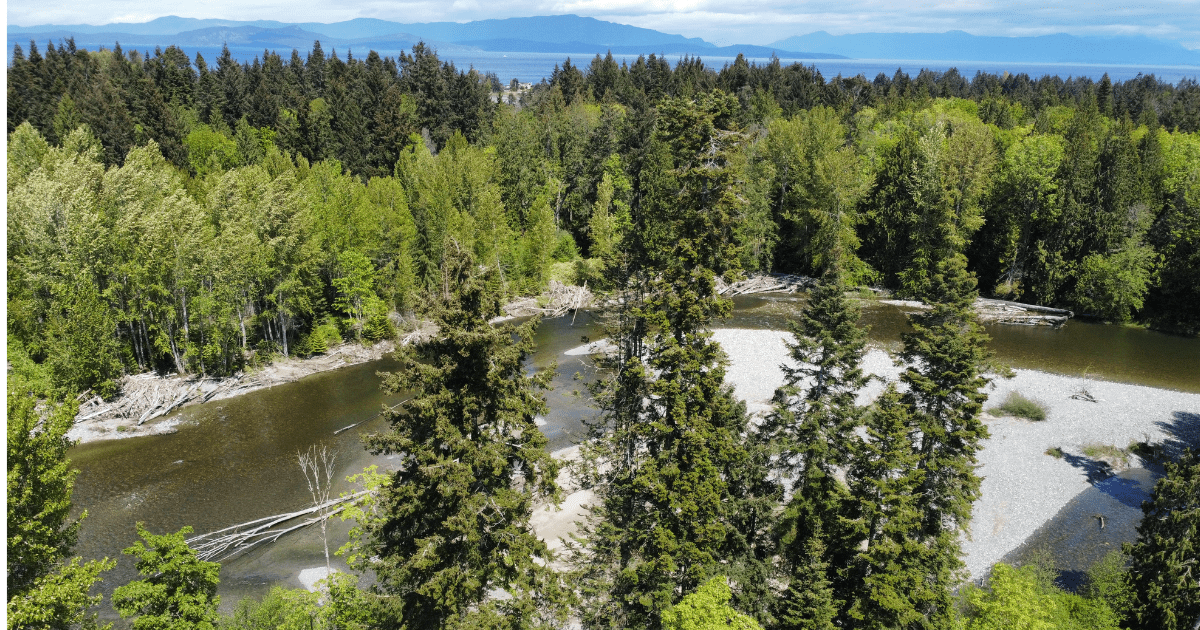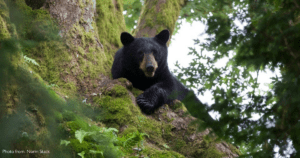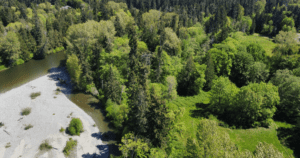
Sept 24, Parksville, B.C.: The Nature Trust of BC, a leading land conservation charity, announces the successful protection of 5.2 hectares (13 acres) of essential wildlife habitat along the Kw’a’luxw (Englishman) River at 130 Shelly Road. The Kw’a’luxw (Englishman) River provides key salmon spawning habitat for all five species of Pacific salmon. This diverse landscape is also recognized as internationally significant habitat for over 250 species of migratory and breeding birds, as well as black bear, cougar, deer, river otter, and Roosevelt elk.
The acquisition of this new conservation area brings the total amount of land protected along the river or within the estuary by the charity to 346 hectares (856 acres)—roughly the size of 650 football fields. This means that over 30% of the riverbank is now protected by The Nature Trust of BC and provincial or local governments.
Earlier this year, the Federal Government announced its investment of nearly $50 million in major nature conservation projects across B.C., including $8 million for The Nature Trust of BC, funded through the Nature Smart Climate Solutions Fund. This Shelly Road conservation project was made possible thanks to funds from this investment and the generosity of the City of Parksville, who donated $1.8 million towards the success of this $3.2 million project. Thanks to all donors on this project, The Nature Trust of BC can ensure that this critical river corridor and habitat for numerous species that depend on it will be protected forever.

Black bear
“This is an incredible win, not just for The Nature Trust of BC and our partners, but for conservation in British Columbia. The Kw’a’luxw (Englishman) River is breathtaking, and a lifeline for wildlife and people. Thanks to the Federal government, the City of Parksville and our donors, we have made another huge step forward in our mission of protecting this magnificent watershed forever. Land conservation is an investment in tomorrow. Every dollar counts.” said Dr. Jasper Lament, CEO, The Nature Trust of BC.
“The Nature Smart Climate Solutions Fund is instrumental in helping us combat climate change and biodiversity loss, supporting our efforts to conserve 30 percent of land and water in Canada by 2030. Through collaboration with partners like The Nature Trust of British Columbia and the invaluable support of generous donors, we are working to protect and restore the natural environment along the Kw’a’luxw (Englishman) River in beautiful British Columbia. Protecting this area serves to boost the region’s capacity to capture and store carbon. Together, we’re safeguarding a critical river corridor that provides a key salmon-spawning habitat and an internationally significant habitat for over 250 species of birds.” said The Honourable Steven Guilbeault, Minister of Environment and Climate Change.
Conserving, managing, and restoring natural and modified ecosystems are fundamental to mitigating and adapting to climate change. Securing and protecting land for future generations and restoring or enhancing natural ecosystems are nature-based solutions to reducing greenhouse gas emissions. One crucial way of storing and capturing carbon is to halt or reduce the conversion of carbon rich ecosystems to other less carbon rich land cover types, such as from a forest, grassland or wetland to cropland or an urban development.
This announcement comes just days after World Rivers Day (September 22), a global celebration of the essential role rivers and waterways play in supporting life on Earth. Rivers like the Kw’a’luxw (Englishman) River are the arteries of our planet, nourishing ecosystems, sustaining wildlife, and enriching human communities. Not only are Pacific salmon viewed by many as an iconic symbol of British Columbia’s fish and wildlife, their life cycle provides many benefits for the ecosystems they live in. As salmon spawn and eventually die their nutrients are dispersed throughout the soil, which helps forests to flourish while stabilizing riverbanks, keeping riparian areas healthy, and providing food for scavenger species.

Shelly Road looking upstream (SE) of Kw’a’luxw (Englishman) River
The Nature Trust of BC is honoured to work in close collaboration with the Snaw-Naw-As (Nanoose) First Nation for the management and long-term stewardship of this area as part of an existing Stewardship and Management Agreement for conservation lands within their traditional territory. For several years, Snaw-Naw-As First Nation and The Nature Trust of BC have worked together on the stewardship, restoration, and monitoring work in the lower river and estuary, including a large-scale project to restore the Kw’a’luxw (Englishman) River sandspit, long-term monitoring of the estuary resilience, and in-stream fish habitat improvements.
“Everything is connected. From the mountains to the shoreline and everything in-between, it is all one thing. It is our responsibility to protect and care for all things connected to Kwa’a’luxw. Snaw-naw-as has a meaningful partnership with The Nature Trust of BC and other stewardship groups with the watershed in mind for future generations. Working together and moving forward is the goal.” Chris Bob, Snaw-Naw-As community member.
“The Kw’a’luxw (Englishman) River is a haven for so many species of fish and wildlife. We are honoured by the support of our donors and will be working closely with the Snaw-Naw-As First Nation to ensure this beautiful watershed is as healthy and vibrant as it deserves to be. This is a huge milestone and, as a team, we are thrilled.” said Tom Reid, West Coast Land Manager, The Nature Trust of BC.
As part of the ongoing stewardship of this conservation area, The Nature Trust of BC and the City of Parksville will collaborate with the Snaw-Naw-As First Nation to create a sustainable community pathway. This trail will not only improve connectivity for the community but will also feature interpretive signs that highlight the cultural and ecological significance of the area. The City of Parksville will be assuming all costs for the design, development, and maintenance of the pathway while The Nature Trust of BC will focus on land management and conservation.
“In recognition of the ecological and community value of 130 Shelly Road, the City of Parksville donated $1.8 million of the property’s appraised value of $2.6 million to protect the Englishman River. We are excited to create a 1,100 metre pathway along Nerbus Lane to the north end of Shelly Road which will enhance accessible pedestrian connectivity in the city and protect sensitive riparian and estuarine areas. We are pleased to partner with The Nature Trust of BC to protect this vital area and create a pathway to showcase the breathtaking Englishman River estuary.” said Doug O’Brien, Parksville Mayor.
This acquisition builds upon The Nature Trust of BC’s 40-year legacy working with its partners to protect the Kw’a’luxw (Englishman) River and watershed, bringing the total number of conservation areas along the river and within the estuary to 12, including the conservation of the Emil Anderson Legacy Forest and Wilson Nature Park. Now that this land has been conserved, connectivity for the fish and wildlife that depend on it has increased and the acquisitions contribute to ensuring the community has clean drinking water.
This project was funded in part by the Government of Canada. The Nature Trust of BC would also like to thank the City of Parksville, Arrowsmith Naturalists, the Grayross Foundation, Greig Greenway Society, John Thwaites, the Krogseth Foundation, and everyone else who donated for their generous contributions to this project.
The conservation of the Shelly Road land parcel is an impactful step towards the preservation of the Kw’a’luxw (Englishman) River and the protection of many wildlife and fish species while contributing to the resilience and long-term sustainability of the river and the communities that rely upon it.
NOTES:
- The Kw’a’luxw (Englishman) River supports all five species of Pacific salmon (chinook, chum, coho, pink, and sockeye) as well as three species of trout (rainbow, cutthroat, and steelhead).
- The area also contains important floodplain, riparian, and forested ecosystems.
ABOUT:
- The Nature Trust of British Columbia is a leading non-profit land conservation charity with over 50 years of success protecting and caring for B.C.’s most critical habitats. Since 1971, The Nature Trust of BC and its partners have conserved more than 73,000 hectares (180,000 acres) of ecologically significant land to save vulnerable wildlife, fish and plants.
- Canada’s Nature Smart Climate Solutions Fund (NSCSF) is a $1.4 billion, ten-year fund (2021–2031) administered by Environment and Climate Change Canada to help conserve, restore, and enhance the management of ecosystems such as wetlands, forests, and grasslands, in order to help tackle the dual crises of climate change and biodiversity loss. The NSCSF will focus on three main objectives: (1) conserving carbon-rich ecosystems at high risk of conversion to other uses that would release their stored carbon; (2) improving land management practices to reduce their greenhouse gas emission-causing impacts on Canada’s ecosystems; and (3) restoring degraded ecosystems. Overall, these projects will contribute to the reduction of greenhouse gas emissions and increased carbon sequestration, while also providing benefits for biodiversity and human well-being.
VIDEO AND IMAGES: Here
LEARN MORE:
Visit: www.naturetrust.bc.ca
Follow us on Twitter: @NatureTrustofBC
Become a fan on Facebook: www.facebook.com/NatureTrustofBC/
Follow us on Instagram: @NatureTrustBC
